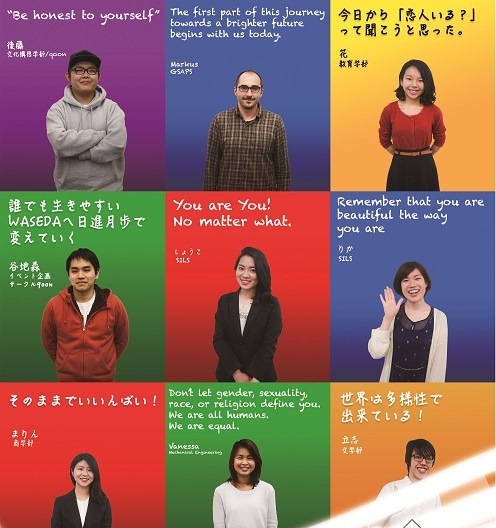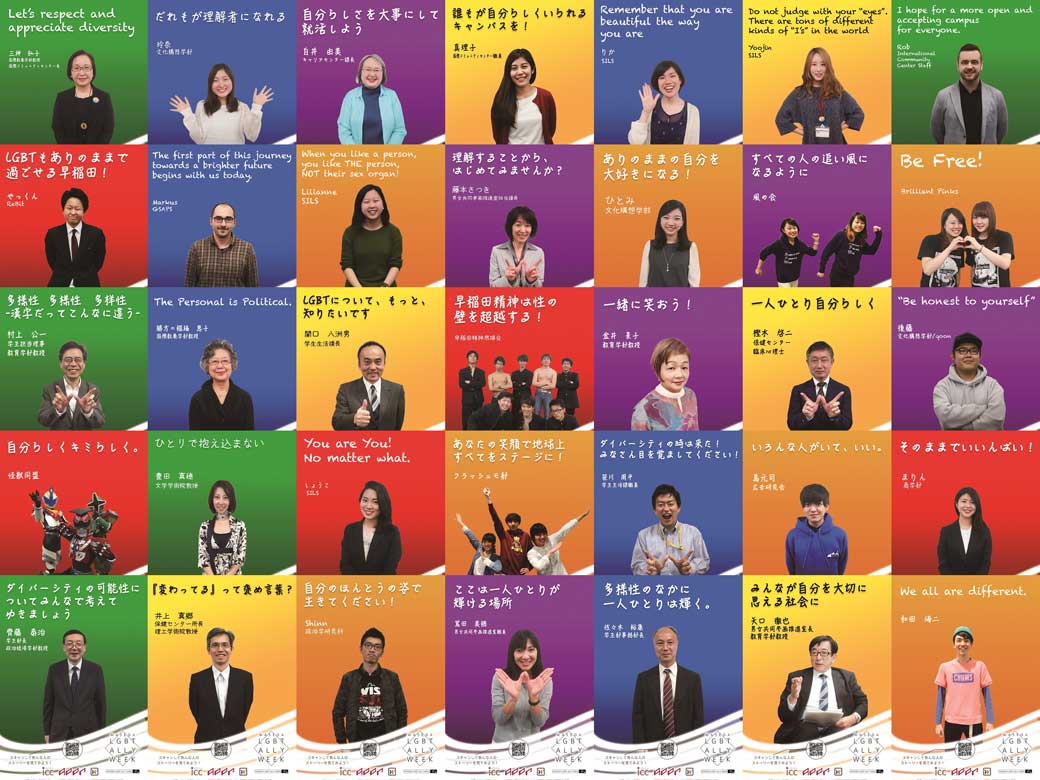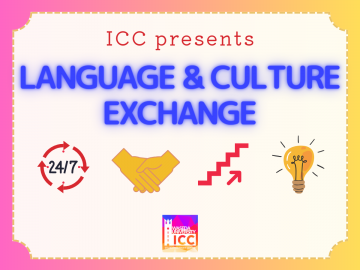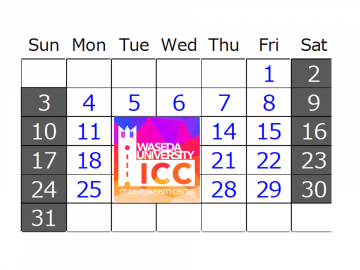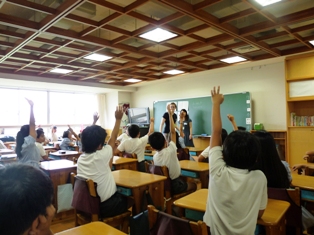In May 2016, Waseda University’s International Community Center (ICC) co-hosted the WASEDA LGBT ALLY WEEK. The concept of this event was to show that anyone can be an ally and support the LGBT community on campus in various ways. Today, we spoke with ICC Administrative Director Kazumi Onouchi (O) and Tomo (T), a Waseda student who planned and organized this event.
How did you become involved with LGBT issues?
T: I’m transgender, but I told almost no one about it until I was in high school. During my college search, I chose Waseda as my top choice because I felt the diverse community here would be accepting and allow me to be who I am. The University is also known to house the largest sexual minority collegiate organization, GLOW, and ReBit, a non-profit organization which proactively releases information regarding LGBT issues. However, when I arrived on campus, things were different. For instance, professors addressed me as “san” instead of “kun” (in Japan, we usually add “san” for women and “kun” for men after addressing their names). This reality was stifling, so then, I decided to organize and promote understanding for LGBT students.
O: In Japan, we divide students by gender with uniforms, and LGBT students come to college campuses with a sense of hope that they could be themselves. However, there is a clear distinction of gender even in college. Although students can choose names to go by, their gender can be identified from the data base according to their family register, and professors use the wrong names from time to time. These details must be worked out in order for us to truly praise our diversity. I hope that this event will raise awareness of everyone on campus.
T): In a particular class, there was a professor who asked female students whether they had a boyfriend or not to lighten up the mood. She saw the letter F for female next to my name, and asked me the same question. I felt uncomfortable and asked her to stop, but I ended up dropping the class due to a misunderstanding between her and me. Some people I know share similar experiences, so I wanted to create a better campus environment through this event.
How did ICC come to co-sponsor this event?
O: At ICC, we believe it is our mission to build understanding for people of all backgrounds and create an inclusive community, not only in terms of race and ethnicity but sexual orientation as well. We have been prepared to host such event for over 2 years, and we decided to host our first LGBT event last December together with ReBit and Diversity Waseda, a student organization which won the President’s Award in the Student Competition. In the December event, many people were content with the outcome and told us they wanted to learn more about LGBT issues. This is why we decided to immediately offer our help when we learned about student organizations planning LGBT ALLY WEEK.
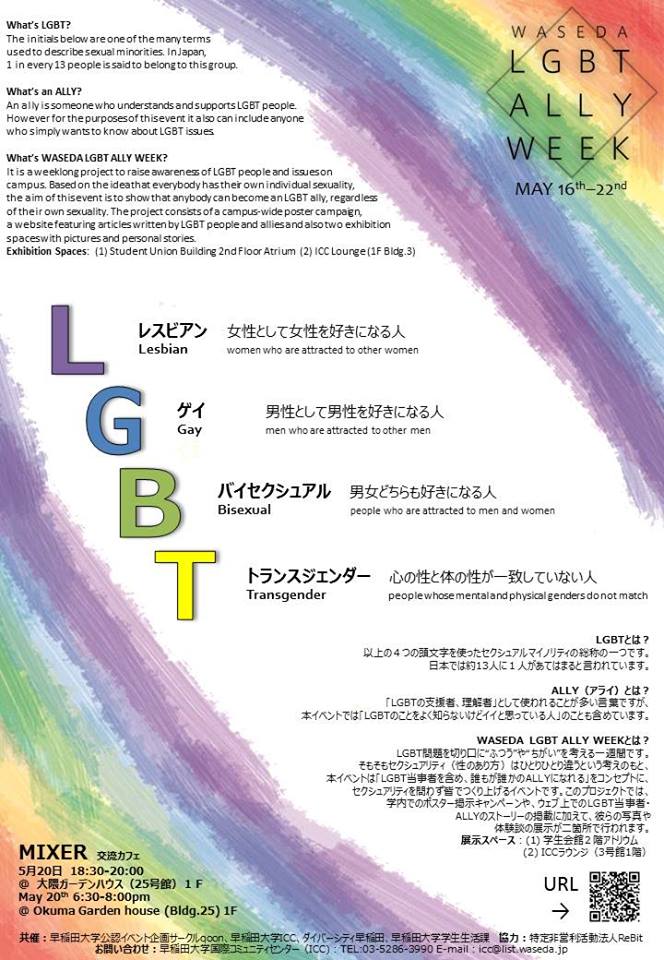
What kind of challenges did you face during the event? What changes did you observe afterwards?
T: We usually think of straight allies, but this event’s concept was that anyone could become an ally. So, I wanted to involve as many LGBT students as possible, but it was very difficult for me to ask them to participate. There are many LGBT students who still remain in the closet and haven’t made their sexuality public. Sometimes, this constant struggle became an overwhelming burden. However, I feel the difference between before and after the event. I received messages that many people who were neutral became more aware of LGBT issues. Some LGBT students I did not know before came up to me and told me thank you. That really left an impression, and I was glad I went through with this event. I was in university when I first came out, and I’m grateful that I was able to carry out this event with my group of friends who are also part of a student club I created called qoon. There are many points to reflect upon, but I feel a great sense of achievement.
What should I be aware of when becoming an ally?
T: One thing to remember is sexuality is different for everyone. For example, even if you were born a man, how much you acknowledge yourself as a man depends on the individual. I always remember not to categorize people when I face someone. LGBT has slowly started to become recognized, but it does not feel quite right if someone were to only see me as transgender. There are many aspects that make me who I am, and it just happens that one of those factors is transgender. I don’t want to be labeled as transgender, and even before sexuality, I want people to see me as one human being.
O: The idea of gender spectrum, which I personally find fascinating, is an unfamiliar concept for those who have been taught that only two genders, male and female, exist in the world.
Just knowing this concept will give an opportunity to self-reflect on our own prejudice and stereotype. It also allows us to contemplate where in the spectrum we land on and think about our own identity.
What kind of support are LGBT students seeking?
O: There is a demand for reforming academic and student life environments, such as renovating facilities to create transgender friendly bathrooms and improving student data when it comes to displaying gender. In the future, I believe all faculty and staff members should be required to take LGBT awareness training. If there is at least one ally staff member in all departments, it would perhaps lift the psychological burden of LGBT students a little.
T: If I know that I could go talk to a staff ally, it would personally be a big help. The procedure for using an alias is a hassle, and you are not permitted to change names unless you have been officially diagnosed with gender dysphoria. Going to the clinic to get diagnosed also costs money. I wonder what students without the resources could do without the diagnosis. If there is someone I could talk to and help find answers to those questions, I would feel very much at ease.
Do you have any final messages?
T: We must always doubt what we consider to be the norm. I’m not necessarily insisting on a society that has proper understanding for LGBT rights, but I’m hoping for a society where everyone can coexist peacefully. A society where everyone lives in content is a society where the LGBT community can feel safe. I would not be satisfied living in an insensitive society where people have understanding for LGBT people but not for others. I am looking forward to creating a place in the world where everyone can live happily.
O: When you realize there are many forms of happiness, it becomes easier for all of us to live. We are now making efforts to increase the understanding of LGBT issues because the lack thereof is conspicuous among Japanese students compared to international students. Although topics surrounding sexual minorities have not yet been discussed at the Japanese higher education institution level, the business world seems more open to sexuality as they tend to hire more and more talented LGBT students. I would like to see Waseda University students acknowledge that sexual minorities are very common among us, and they must be the ones creating a better society for all.
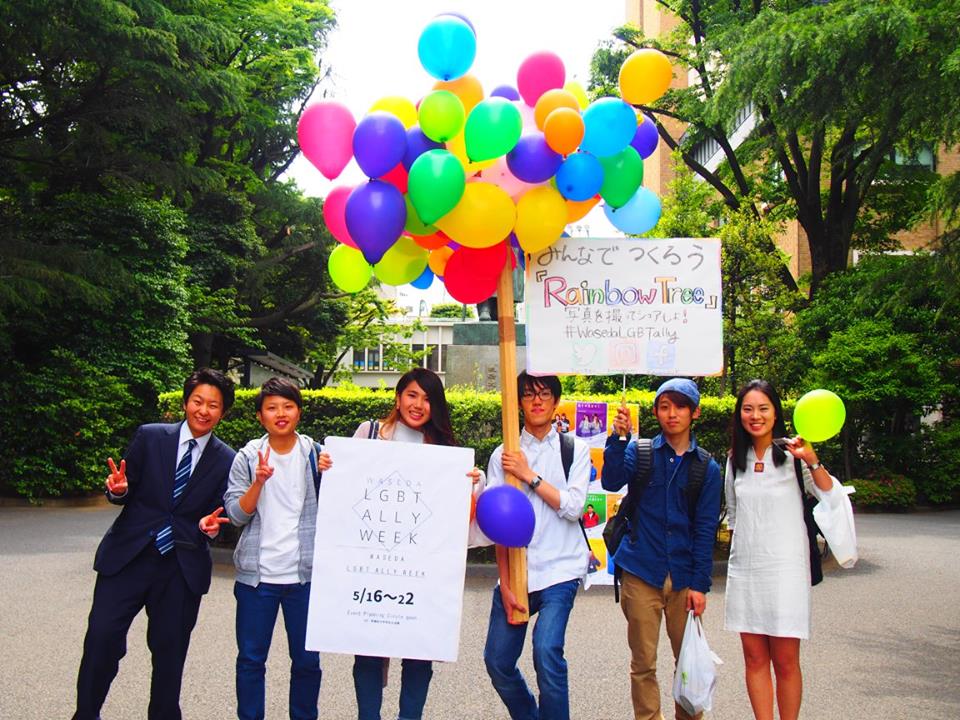
Tomo currently gives lectures at schools and education board meetings to promote understanding for LGBT students through ReBit. In addition, he serves as a board member for an official student organization, qoon, where they organize events with a focus on social justice.
At Waseda University, we value diversity and promise to create a better university environment for everyone.

